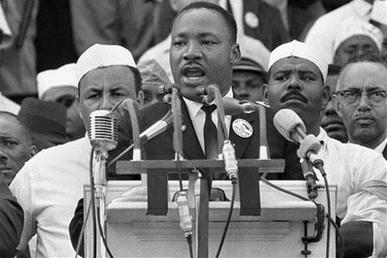
STEVE EMBER: Welcome to THE MAKING OF A NATION – American history in VOA Special English. I'm Steve Ember.
Today, we tell about the movement for civil rights for black Americans.
(SOUND)
The day is August 28th, 1963. More than 250,000 people are gathered in Washington. Black and white, young and old, they demand equal treatment for black Americans. The nation's most famous civil rights leader, the Reverend Martin Luther King Junior, is speaking.
MARTIN LUTHER KING: "I am happy to join with you today in what will go down in history as the greatest demonstration of freedom in the history of our nation."
(MUSIC)
Early in its history, black Africans were brought to America as slaves. They were bought and sold, like animals. By the time of America's Civil War in the 1860s, many had been freed by their owners. Many, however, still worked as slaves on the plantations, or large farms, of the South. By the end of the war, slavery had been declared unconstitutional. But that was only the first step in the struggle for equality.
Most people of color could not get good jobs. They could not get good housing. They had far less chance of a good education than white Americans. For about 100 years, blacks made slow gains. Widespread activism for civil rights did not really begin until after World War Two. During the war, black Americans earned respect as members of the armed forces. When they came home, many demanded that their civil rights be respected, too. An organization, the National Association for the Advancement of Colored People, led the way.
In 1951, the organization sent its lawyers to help a man in the city of Topeka, Kansas. The man, Oliver Brown, and 12 others had brought legal action against the city. They wanted to end racial separation in their children's schools. That policy was known as segregation.
At that time, two of every five public schools in America had all white students or all black students. The law said all public schools must be equal, but they were not. Schools for white children were almost always better than schools for black children. The situation was worst in Southern states.
The case against the city of Topeka -- Brown versus the Board of Education -- was finally settled by the nation's highest court. In 1954, the Supreme Court ruled that separate schools for black children were not equal to schools for white children. The next year, it said public schools must accept children of all races as quickly as possible.
(MUSIC)
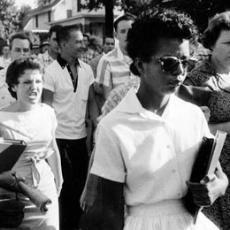
In September 1957, a black girl attempted to enter an all-white school in the city of Little Rock, Arkansas.
(SOUND)
An angry crowd shouted at her. State guards blocked her way. The guards had been sent by the state governor, Orville Faubus. After three weeks, a federal court ordered Governor Faubus to remove the guards. The girl, Elizabeth Eckford, and other black students were able to enter the school. After one day, however, riots forced the black students to leave.
President Dwight Eisenhower ordered federal troops to Little Rock. They helped black students get into the white school safely. However, angry white citizens closed all the city's public schools. The schools stayed closed for two years.
(MUSIC)
In 1962, a black student named James Meredith sought to attend the University of Mississippi. School officials refused. John Kennedy, the president at that time, sent federal law officers to help him.
James Meredith became the first black person to graduate from the University of Mississippi.
In addition to fighting for equal treatment in education, black Americans fought for equal treatment in housing and transportation.
(SOUND)
In many cities of the South, blacks were forced to sit in the back of buses. In 1955, a black woman named Rosa Parks got on a bus in the city of Montgomery, Alabama. She sat in the back. The bus became crowded. There were no more seats for white people. So, the bus driver ordered Missus Parks to stand and give her seat to a white person.
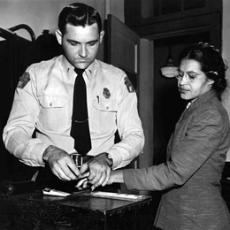
She refused. Her feet were tired after a long day at work. Rosa Parks was arrested.
MARTIN LUTHER KING: "For a number of years, Negro passengers on the city bus lines of Montgomery have been humiliated, intimidated, and faced threats on this bus line."
The Reverend Martin Luther King organized the black citizens of Montgomery. They were the major users of the bus system. They decided to stop using the buses.
MARTIN LUTHER KING: "At present, we are in the midst of a protest, the black citizens of Montgomery, representing some 44 percent of the population. Ninety percent, at least, of the regular Negro bus passengers are staying off the buses, and we plan to continue until something is done."
(MUSIC)
The boycott lasted a little more than a year. It seriously affected the earnings of the bus company. In the end, racial separation on the buses in Montgomery was declared illegal. Rosa Parks' tired feet had helped win black Americans another victory in their struggle for equal rights. And, the victory had been won without violence.
The Reverend King was following the teachings of former Indian leader Mohandas Gandhi. Gandhi urged his followers to reach their political goals without violence. One of the major tools of non-violence in the civil rights struggle in America was the "sit-in". In a sit-in, protesters entered a store or public eating place. They quietly asked to be served. Sometimes, they were arrested. Sometimes, they remained until the business closed. But they were not served. Some went hours without food or water.
(MUSIC: "Buses Are A-Coming")
Another kind of protest was the "freedom ride." This involved buses that traveled through states from the North to the South. On freedom rides, blacks and whites sat together to make it difficult for officials to enforce racial separation laws on the buses.
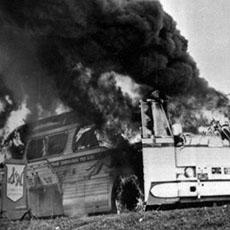
Many freedom rides -- and much violence -- took place in the summer of 1964. Sometimes, the freedom riders were arrested. Sometimes, angry crowds of whites beat the freedom riders.
(MUSIC)
Perhaps the most dangerous part of the civil rights movement was the campaign to win voting rights for black Americans. The 15th Amendment to the Constitution said a citizen could not be denied the right to vote because of race or color. Several Southern states, however, passed laws to try to deny voting rights to blacks for other reasons.
Martin Luther King and his supporters demanded new legislation to guarantee the right to vote. They held protests in the state of Alabama. In the city of Birmingham, the chief law officer ordered his men to fight the protesters with high-pressure water hoses and fierce dogs.
People throughout the country watched the demonstration on television. The sight of children being beaten by policemen and bitten by dogs awakened many citizens to the civil rights struggle. Federal negotiators reached a compromise. The compromise was, in fact, a victory for the protesters. They promised to stop their demonstrations. In exchange, they would be permitted to vote.
(MUSIC: "The Freedom Train Is Coming")
President Lyndon Johnson signed a major civil rights bill in 1964. Yet violence continued in some places. Three civil rights workers were murdered in Mississippi. One was murdered in Alabama.
Martin Luther King kept working toward the goal of equal rights. On April 4th 1968, he died working toward that goal.
King was shot to death in Memphis, Tennessee. He had gone there to support a strike by waste collection workers.
WALTER CRONKITE: "Doctor King was standing on the balcony of his second floor hotel room tonight when, according to a companion, a shot was fired from across the street. In the friend's words, the bullet exploded in his face."
CBS newsman Walter Cronkite.
WALTER CRONKITE: "The police, who have been keeping a close watch over the Nobel Peace Prize winner because of Memphis' turbulent racial situation, were on the scene almost immediately. They rushed the 39 year old Negro leader to a hospital, where he died of a bullet wound in the neck."
A white man, James Earl Ray, was tried and found guilty of the crime.
(MUSIC)
A wave of unrest followed the murder of Martin Luther King. Blacks in more than 100 cities in America rioted. In some cities, areas affected by the riots were not rebuilt for many years. The movement for civil rights for black Americans continued. But it became increasingly violent. The struggle produced angry, bitter memories. Yet it also produced some of the greatest words spoken in American history.
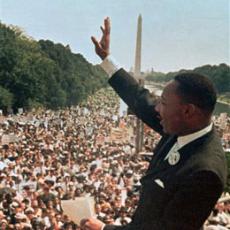
MARTIN LUTHER KING: "When we allow freedom to ring, when we let it ring from every village and every hamlet, from every state and every city, we will be able to speed up that day when all of God's children -- black men and white men, Jews and Gentiles, Protestants and Catholics -- will be able to join hands and sing in the words of the old Negro spiritual: 'Free at last! Free at last! Thank God almighty, we are free at last!'"
(MUSIC)
Nest week, we continue the story of the United States in the 1960s.
You can find our series online with transcripts, MP3s, podcasts and pictures at voaspecialenglish.com. You can also follow us on Facebook and Twitter at VOA Learning English. I'm Steve Ember, inviting you to join us again next week for THE MAKING OF A NATION -- American history in VOA Special English.
A memorial fit for a king opens in Washington
Michelle Obama calls young Africans to action
Obama honors Martin Luther King, Jr.
Height, Hooks: the passing of two civil rights leaders
(來源:VOA 編輯:Rosy)
